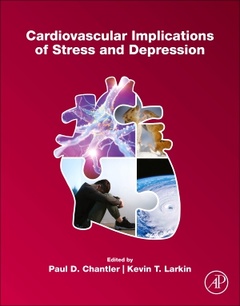Description
Cardiovascular Implications of Stress and Depression
Coordinators: Chantler Paul D., Larkin Kevin T.
Language: English
Subject for Cardiovascular Implications of Stress and Depression:
377 p. · 15x22.8 cm · Paperback
Description
/li>Contents
/li>Readership
/li>Biography
/li>Comment
/li>
Cardiovascular Implications of Stress and Depression provides an in-depth examination on how exposure to stress influences risk for cardiovascular disease and how depression is associated with this relationship. This authoritative volume examines causal pathways linking stress, depression and cardiovascular disease. In addition, it provides mechanistic insights into how environmental stress can lead to cardiovascular diseases. Current information about mechanistic factors, clinical and epidemiological aspects, and management issues associated with stress/depression are presented. These insights demonstrate how the mechanisms behind chronic stress and depression lead to cardiovascular diseases. In addition, their role in existing diseases (such as obesity, hypertension, and diabetes) is explored.
1. Introduction
Section 1: EVIDENCE LINKING STRESS WITH DEPRESSION AND CARDIOVASCULAR DISEASE 2. Epidemiological Evidence Linking Stress and Depression with CVD 3. Translational Research from Animal Models 4. Intervention Research on Therapies that aim to Treat Depression and Cardiovascular Disease
Section 2: MECHANISMS LINKING STRESS AND DEPRESSION WITH CARDIOVASCULAR DISEASE 5. Autonomic and Neuroendocrine Response to Stress 6. Circulatory System Alterations under Stress 7. Cortical Responses to Stress and Depression 8. The Role of Inflammation and Oxidative Stress in Depression and Cardiovascular Disease 9. Social Support and Stress, Depression and Cardiovascular Disease 10. The Influence of Health Behaviors upon the Association between Stress and Depression and Cardiovascular Disease 11. The Gut-Brain Axis: The Missing Link in Depression 12. Future Directions and Concluding Remarks
Researchers of cardiology, physiology, pharmacology, psychology, epidemiology and neuroscience as well as cardiologists.
Kevin T. Larkin, PhD, ABPP, is a Professor and Chair of the Department of Psychology at the West Virginia University. His research focuses on applied psychophysiology and clinical health psychology, with a special interest in how behavioral and emotional factors influence health. Dr. Larkin also directs the Behavioral Physiology Laboratory and his applied research has focused on patients with cardiovascular disease, essential hypertension, and other health conditions. He is board certified by the American Board of Professional Psychology in the area of clinical health psychology.
- Provides the latest information on how stress leads to depression and how stress/depression interacts to accelerate cardiovascular diseases, including stroke
- Delivers insights on how mechanisms of stress/depression affect vasculature
- Explores how to best research this topic from human and pre-clinical models
These books may interest you

Oxidative Stress and Inflammatory Mechanisms in Obesity, Diabetes, and the Metabolic Syndrome 74.82 €

Inflammation in Psychiatry 157.33 €

